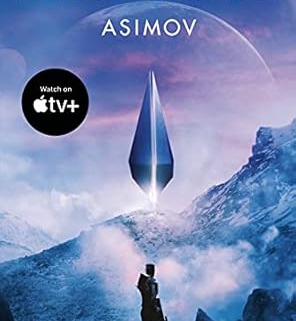8 Recomended Books Like Dune
8 Recomended Books Like Dune: Epic Sagas That Will Transport You to New Worlds – If Dune’s sweeping desert landscapes, intricate politics, and philosophical depth left you craving more, these 10 masterpieces will quench your thirst for grand-scale storytelling. From galaxy-spanning empires to ecological revolutions, these books echo Dune’s brilliance while carving their own legendary paths. Let’s embark on this interstellar journey!
1. Hyperion by Dan Simmons
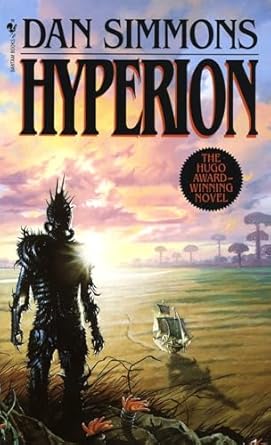
Synopsis:
In Hyperion, seven pilgrims journey to the Time Tombs on the desert planet Hyperion, a place haunted by the Shrike—a mythical, blade-covered entity worshipped as both a god and a harbinger of doom. Each pilgrim shares their story, revealing connections to Hyperion’s mysteries: a priest tormented by an alien cruciform, a soldier haunted by a time-looping love affair, and a scholar whose daughter ages backward in a temporal nightmare. The novel weaves political intrigue, ecological collapse, and existential dread into a tapestry reminiscent of Dune’s galactic power struggles, with desert planets, sentient AI, and civilizations teetering on ruin.
Personal Opinion:
Hyperion is a masterpiece of layered storytelling, blending The Canterbury Tales’ structure with Dune’s cosmic grandeur. Fans of Paul Atreides’ messianic journey will adore the pilgrims’ emotionally charged narratives, particularly Sol Weintraub’s heartbreaking struggle to save his daughter from a time-curse. Simmons’ world-building—from the techno-decadent Hegemony to the oceanic Maui-Covenant—rivals Herbert’s Arrakis in depth. If you crave a saga where philosophy collides with interstellar spectacle, this is your next obsession.
Critical Analysis:
- Themes: Time’s tyranny, redemption through suffering, the collapse of civilization.
- Strengths: A kaleidoscopic narrative structure, lush prose, and characters that linger in your soul.
- Weaknesses: The non-linear storytelling and dense philosophical tangents may overwhelm casual readers.
Author Background:
Dan Simmons, a former teacher, has won Hugo, Nebula, and World Fantasy awards…
Publication Details:
Publisher: Doubleday
Year: 1989
ISBN: 978-0385263506
2. Foundation by Isaac Asimov
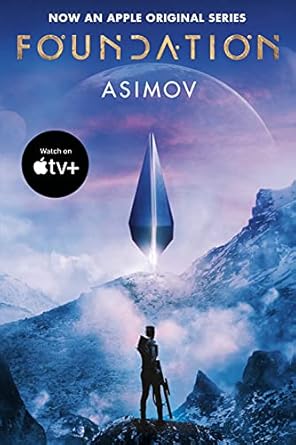
Synopsis:
Mathematician Hari Seldon foresees the collapse of the 12,000-year Galactic Empire and devises “psychohistory” to shorten the ensuing Dark Age. By establishing two Foundations—one overt, one secret—he manipulates humanity’s trajectory across centuries. The story spans generations, from the rise of Merchant Princes to the enigmatic mutant known as the Mule, mirroring Dune’s themes of prescience, political chess, and the fragility of empire.
Personal Opinion:
Asimov’s cold, cerebral brilliance shines here, offering a stark contrast to Dune’s mysticism. While Herbert’s spice-driven mystique enchants, Foundation thrills with its clinical dissection of societal evolution. The tension between Seldon’s deterministic plan and human unpredictability echoes Paul’s battle against his own visions. If you loved the Landsraad’s scheming or the Spacing Guild’s monopoly, Foundation’s Machiavellian twists will leave you spellbound.
Critical Analysis:
- Themes: The cyclical rise/fall of empires, free will vs. determinism, the power of knowledge.
- Strengths: Revolutionary world-building, intellectual rigor, and a sprawling timeline.
- Weaknesses: Thin character development compared to Dune.
Author Background:
A biochemistry professor and prolific writer, Asimov shaped sci-fi’s “Golden Age.”
Publication Details:
Publisher: Gnome Press
Year: 1951
ISBN: 978-0385177255
3. The Fifth Season by N.K. Jemisin
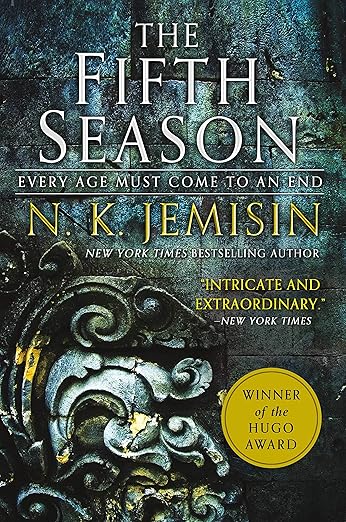
Synopsis:
In the Stillness—a supercontinent ravaged by apocalyptic “Seasons”—orogenes wield tectonic powers feared by society. Essun, a mother and fugitive orogene, navigates a world where her kind are enslaved, even as she searches for her kidnapped daughter. Interwoven timelines reveal Syenite, a young orogene forced into breeding servitude, and Damaya, a girl surviving brutal training. The trilogy’s ecological collapse and systemic oppression parallel Dune’s spice-driven exploitation and Fremen resilience.
Personal Opinion:
Jemisin’s prose is volcanic in its intensity, blending fantasy and sci-fi into a modern classic. Essun’s rage against environmental abuse and patriarchal control mirrors Paul’s transformation but with a feminist ferocity. The Stillness’ harsh beauty rivals Arrakis, and the magic system—rooted in geology—feels as revolutionary as the Bene Gesserit’s eugenics. If Dune’s ecological warnings gripped you, The Fifth Season’s indictment of climate injustice will leave you breathless.
Critical Analysis:
- Themes: Environmental racism, motherhood as resistance, the trauma of oppression.
- Strengths: A groundbreaking second-person narrative, complex characters, and a magic system.
- Weaknesses: The fragmented timelines may confuse readers initially.
Author Background:
N.K. Jemisin made history by winning three consecutive Hugos…
Publication Details:
Publisher: Orbit
Year: 2015
ISBN: 978-0316229296
4. The Left Hand of Darkness by Ursula K. Le Guin
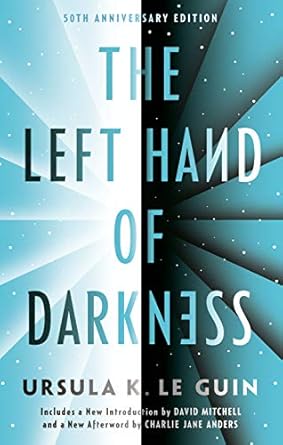
Synopsis:
On the icy planet Gethen, where humans are ambisexual (shifting gender monthly), envoy Genly Ai struggles to persuade its nations to join the galactic Ekumen. Political intrigue and cultural misunderstandings escalate until Ai and exiled leader Estraven trek across glaciers, forging a bond that transcends gender and species. Le Guin’s exploration of diplomacy, identity, and prophecy mirrors Dune’s Fremen-Imperium tensions, swapping sand for snow and spice for silence.
Personal Opinion:
Le Guin’s quiet, philosophical genius redefines sci-fi. The slow-burn camaraderie between Ai and Estraven is as profound as Paul and Chani’s love, challenging readers to rethink empathy and belonging. Gethen’s gender-fluid society and kemmering rituals rival Arrakis’ ecological intricacies, offering a timeless meditation on unity and difference. If Dune’s anthropological depth captivated you, this book is a soul-stirring companion.
Critical Analysis:
- Themes: Gender fluidity, the ethics of diplomacy, isolation vs. connection.
- Strengths: Revolutionary gender exploration, poetic prose, and a climactic journey.
- Weaknesses: Pacing is deliberate; readers craving action may find it slow.
Author Background:
Ursula K. Le Guin, influenced by her anthropologist father, reshaped sci-fi…
Publication Details:
Publisher: Ace Books
Year: 1969
ISBN: 978-0441478125
5. Dawn by Octavia E. Butler
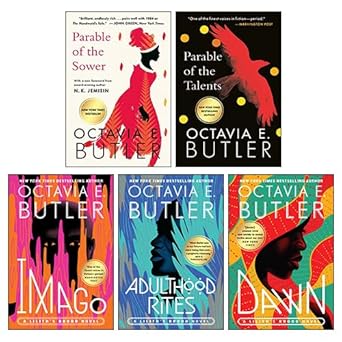
Synopsis:
In Dawn, humanity teeters on extinction after nuclear war, and survivor Lilith Iyapo awakens aboard an alien ship to find herself part of the Oankali’s genetic experiment. These three-gendered beings seek to merge with humans to survive, offering salvation at the cost of species identity. As Lilith navigates mistrust from fellow humans and the Oankali’s unsettling benevolence, the novel grapples with consent, evolution, and what it means to remain “human” in a universe hostile to stagnation. Like Dune, it interrogates power dynamics and survival ethics on a cosmic scale, swapping desert politics for biological imperatives.
Personal Opinion:
Butler’s prose is unflinching and prophetic, weaving existential dread with razor-sharp empathy. Fans of Dune’s ecological and social critiques will adore the Oankali’s chilling logic, which mirrors the Bene Gesserit’s long-game eugenics. The tension between Lilith’s pragmatism and human tribalism is as gripping as Paul’s moral unraveling, leaving you haunted by questions of agency and sacrifice.
Critical Analysis:
- Themes: Survival ethics, xenophobia, genetic determinism.
- Strengths: Butler’s mastery of moral ambiguity; the Oankali’s eerie yet logical alienness.
- Weaknesses: Pacing slows in middle sections; some readers may find the lack of clear heroes disorienting.
Author Background:
Octavia E. Butler, a pioneer of Afrofuturism, won Hugo and Nebula awards for her exploration of race, gender, and power. Her work redefined sci-fi’s capacity for social commentary.
Publication Details:
– Publisher: Warner Books
– Year: 1987
– ISBN: 978-0446603775
6. Lord of Light by Roger Zelazny
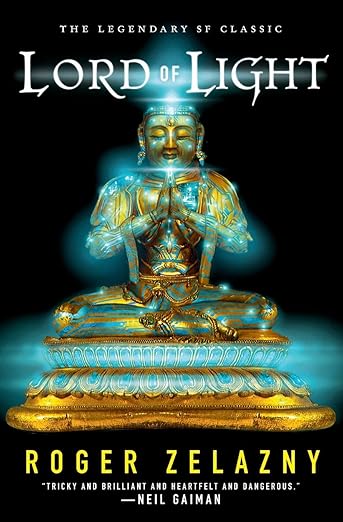
Synopsis:
On a colony planet ruled by Hindu deities, the rebel Sam—once Siddhartha—wages war against godlike immortals who hoard technology as divine power. Blending Hindu mythology with sci-fi, Zelazny crafts a tale of reincarnation, rebellion, and enlightenment. Like Dune’s messianic Paul, Sam manipulates religion to overthrow a stagnant empire, but his victory comes at a cost that echoes Leto II’s Golden Path.
Personal Opinion:
Zelazny’s mythic grandeur is a feast for the imagination. The fusion of cosmic karma and laser guns feels both ancient and cutting-edge, much like Dune’s spice-driven mysticism. Sam’s wit and moral complexity make him a counterpart to Paul Atreides, though his journey is laced with more dark humor.
Critical Analysis:
- Themes: Religion as control, cyclical history, liberation through chaos.
- Strengths: Dazzling prose; inventive blending of myth and tech.
- Weaknesses: Non-linear storytelling and dense references may challenge casual readers.
Author Background:
Roger Zelazny, a luminary of New Wave sci-fi, won six Hugos and three Nebulas. His work bridges poetic lyricism and pulp adventure.
Publication Details:
– Publisher: Doubleday
– Year: 1967
– ISBN: 978-0380014030
7. The Shadow of the Torturer by Gene Wolfe
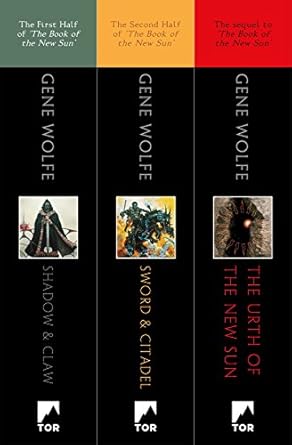
Synopsis:
In a dying, far-future Earth, Severian, an apprentice torturer, is exiled for showing mercy—a crime that propels him into a labyrinth of political intrigue, alien relics, and existential philosophy. Wolfe’s narrative mirrors Dune’s thematic depth, exploring how power corrupts and mythologies are manufactured. The torturers’ guild, with its ritualized cruelty, evokes the Harkonnens’ sadistic grip on Arrakis.
Personal Opinion:
Wolfe’s layered, unreliable narration is a masterclass in subtlety. Severian’s journey from obedient tool to self-aware actor parallels Paul’s transformation, but with a gothic, introspective twist. The world-building—a blend of medieval decay and forgotten tech—rivals Herbert’s in richness.
Critical Analysis:
- Themes: Memory’s fallibility, redemption through storytelling, the weight of tradition.
- Strengths: Exquisite prose; morally complex characters.
- Weaknesses: Deliberate pacing and dense symbolism may deter some.
Author Background:
Gene Wolfe, a former engineer, is celebrated for his literary sci-fi/fantasy hybrids. His Book of the New Sun series is often hailed as a genre-defining work.
Publication Details:
– Publisher: Simon & Schuster
– Year: 1980
– ISBN: 978-0671220667
8. The Stars Are Legion by Kameron Hurley

Synopsis:
In a decaying swarm of biomechanical world-ships, amnesiac Zan embarks on a visceral quest to reclaim her identity and stop a cosmic war. Hurley’s universe—a grotesque, feminist reimagining of Dune’s ecological themes—features living ships, body horror, and matriarchal factions battling for survival. Like Leto II’s symbiotic rule, Zan’s connection to the Legion’s organic tech blurs the line between savior and destroyer.
Personal Opinion:
Hurley’s unapologetically brutal vision is a revelation. The absence of traditional gender roles and emphasis on bodily autonomy subvert sci-fi tropes, offering a fresh take on Dune’s power struggles. Zan’s raw, visceral journey—part redemption, part rebirth—will haunt you long after the final page.
Critical Analysis:
- Themes: Corporeal autonomy, cycles of violence, ecological interdependence.
- Strengths: Bold world-building; feminist and queer subtext.
- Weaknesses: Graphic body horror and bleak tone may alienate some.
Author Background:
Kameron Hurley, a Hugo-winning author, is known for her gritty, gender-fluid narratives and unflinching exploration of power dynamics.
Publication Details:
– Publisher: Saga Press
– Year: 2017
– ISBN: 978-1481457818
Why These Books Resonate with Dune Fans
Each novel mirrors Dune’s core elements—galactic politics, ecological urgency, and existential philosophy—while carving unique legacies. From Hyperion’s mythic odysseys to The Fifth Season’s feminist revolt, these stories expand Herbert’s vision into new frontiers. Dive in and let these sagas transport you to worlds as vast and wondrous as Arrakis! 🏜️✨
Final Thoughts
These books aren’t mere recommendations—they’re gateways to universes where every page pulses with the spirit of Dune. Whether you’re drawn to ecological revolutions, mind-bending politics, or heroes torn between love and destiny, these sagas promise to ignite your imagination. So grab a cup of spice coffee, settle into your stillsuit, and prepare to lose yourself in worlds where the stakes are galactic and the stories unforgettable. 🌌📚
For more cosmic adventures, explore the sources cited or dive into the linked reviews!
- Review Lost Girls: An Unsolved American Mystery by Robert Kolker
- Review: House of Earth and Blood by Sarah J. Maas
- Review: House of Sky and Breath by Sarah J. Maas
- Review: House of Flame and Shadow by Sarah J. Maas
- Review: Let Them Theory
- Review: Great Big Beautiful Life (Reese’s Book Club)
- Review: Sunrise on the Reaping
- Review: The Lost Bookshop

